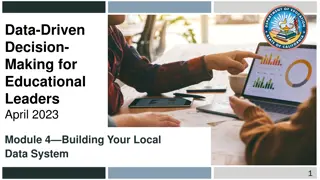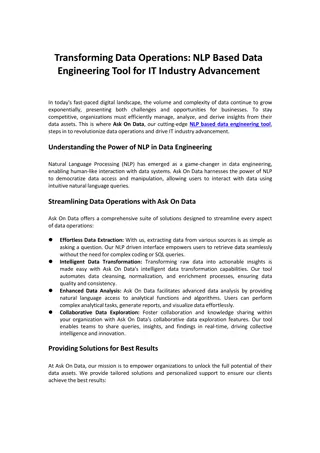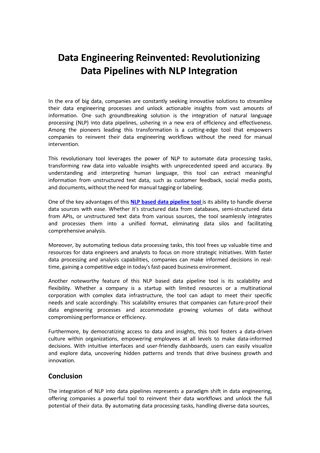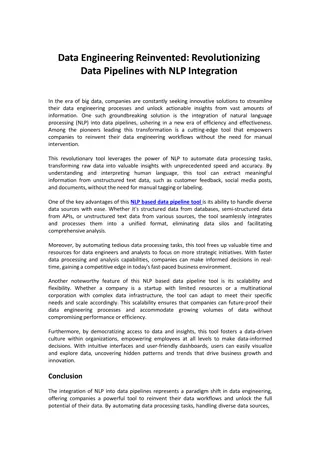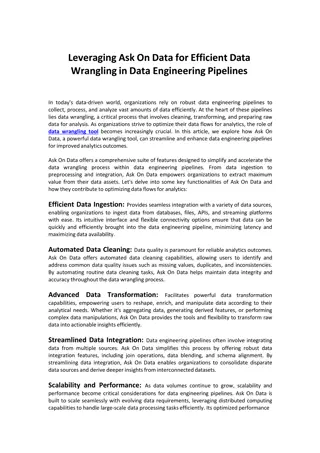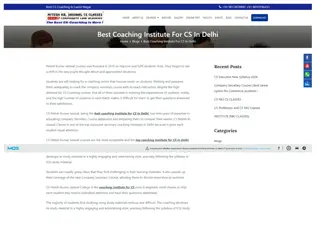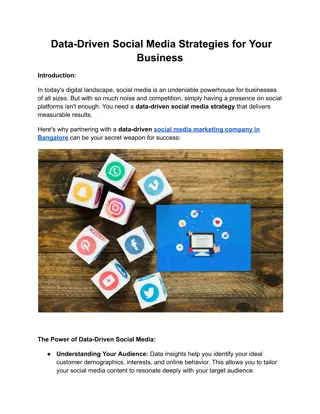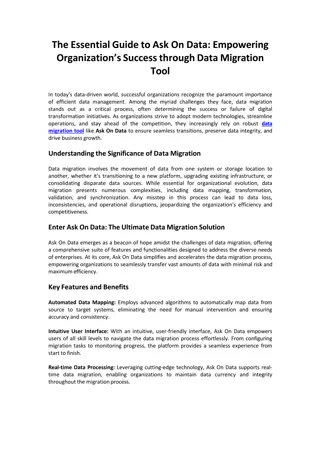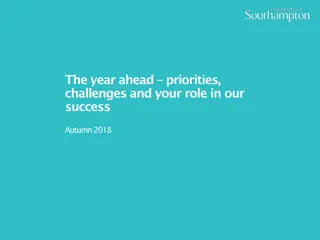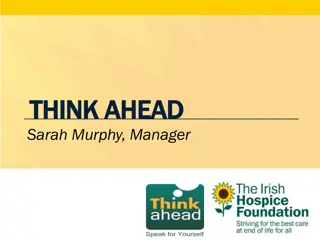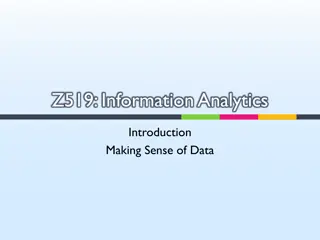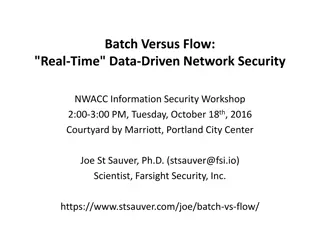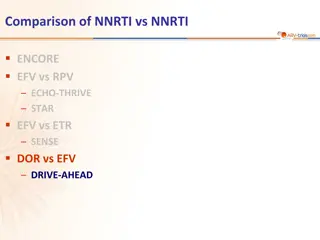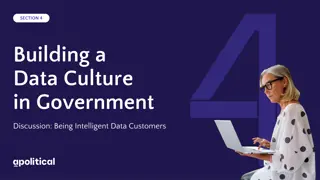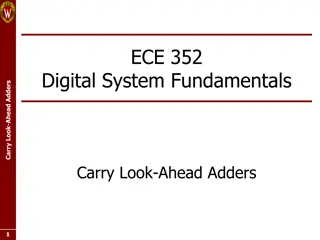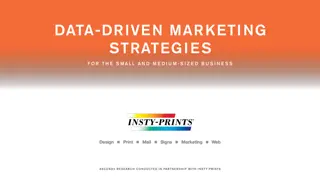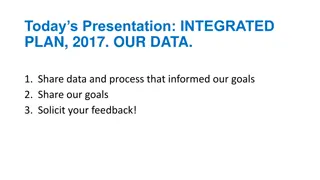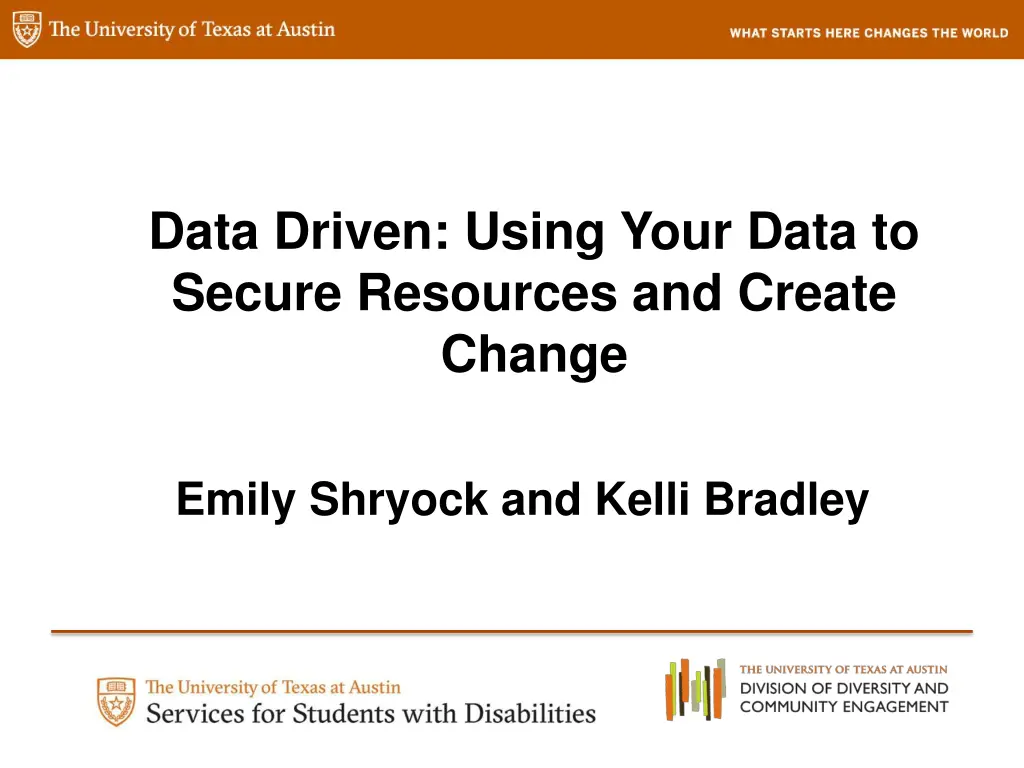
Enhance Resource Management through Data-Driven Strategies
Discover how to effectively secure resources and drive positive change by leveraging data insights. Learn about data collection methods, storing practices, student demographics analysis, and more to optimize support services in educational settings.
Download Presentation

Please find below an Image/Link to download the presentation.
The content on the website is provided AS IS for your information and personal use only. It may not be sold, licensed, or shared on other websites without obtaining consent from the author. If you encounter any issues during the download, it is possible that the publisher has removed the file from their server.
You are allowed to download the files provided on this website for personal or commercial use, subject to the condition that they are used lawfully. All files are the property of their respective owners.
The content on the website is provided AS IS for your information and personal use only. It may not be sold, licensed, or shared on other websites without obtaining consent from the author.
E N D
Presentation Transcript
Data Driven: Using Your Data to Secure Resources and Create Change Emily Shryock and Kelli Bradley
We are so much busier than we used to be! I am spending a lot of time talking to professors who have questions about accommodations. It seems like we have more students coming in with complex medical/mental health conditions.
We are so much busier than we used to be! Busier with what? I am spending a lot of time talking to professors who have questions about accommodations. How much time? It seems like we have more students coming in with complex medical/mental health conditions. How do you define complex? How many students?
We are so much busier than we used to be! We set a record this year for number of Walk In and intake appointments I am spending a lot of time talking to professors who have questions about accommodations. During Spring 2016 we had 695 conversations with faculty/staff It seems like we have more students coming in with complex medical/mental health conditions. 43% of students have more than 1 diagnosis
Data facts or information used usually to calculate, analyze, or plan something http://www.merriam-webster.com/dictionary/data (italics added)
Data Collection What data are you collecting? How are you collecting your data? Why do you collect that data or how are you using the data?
Collecting and Storing Data Source of Data Registrar Data Student Self-Report Medical Documentation Calendar Student Surveys Data Storage Paper Files Database (ClockWork) Spreadsheets Survey Tools
Student Demographics Age, Race, Ethnicity, Residency, Gender, Classification Understand how population of students with disabilities compares to student body Informs outreach effort to underrepresented groups more targeted outreach to freshman, students of color, transfer students
Disability Information Diagnosis, Onset, History of Accommodations Understand shifting disability populations More partnerships with campus services Informs outreach strategies Recognize students coming from background with accommodations in another setting
Services Provided Number of student appointments, tests proctored, interpreting hours provided Track demand across all areas (outreach, admin time, etc.) Document how staff are spending time Recognize what opportunities are not possible due to other demands
Securing Resources What Do you Need? Staff, Space, Technology, etc. What Data Supports this Need? Do you have this data or need to start collecting it? Who is your intended audience Who has the authority/ability to make decisions? How can you best communicate your need?
Advocating for More Staff More student contact Emails, phone calls, follow up appts. Growing caseloads Increased complexity/multiple disabilities Consistent Growth Trends across years Consequences of Not Adding More Staff Delay in Service Provision Staff Burnout/Turnover Risk of OCR Complaint
Securing Resources with Data Demonstrated increasing demand over years Started collecting data and having conversations years before position was approved Clearly and repeatedly communicated importance to relevant decision-makers
Testing Center More students with testing accommodations Growing need for proctored exams outside class time Bench marking with other universities Consequences Stress on students Burden on faculty Risk of OCR complaint
Securing Resources with Data Collaborated with student government Drafted legislation in support of testing center Conversations with deans/department chairs Encouraged them to document their own need Joined existing efforts for testing space Online classes with in-person exams
Funding for Deaf/HH Increased demand for services (interpreting, CART, Typewell) More students taking more classes Competitive pay to attract and retain qualified providers Consequences Negative impact on student performance Delay in service provision Risk of OCR Complaint
Securing Resources with Data Projected expenses for coming year based on currently enrolled students Bench marking hourly rates with local agencies and universities Impact of Affordable Care Act on hours worked
Creating Change: Strategic Outreach What data informs your outreach efforts? 33% of students using accommodations were diagnosed while they were in college 47% of students were continuing accommodations from another setting 24% of students are transfer students
Creating Change with Data How are you advertising your office/services? Where are you advertising? When are you advertising?
Orientation Overhaul Participated in Literature Display Included information in required Diversity Play Incorporated DS slides into TV displays throughout orientation Tabling= Ineffective Too much stigma to approach Students don t think/know they need accommodations Students don t associate their condition with disability
Unusual but Useful Data How many other universities contact us with questions? What page on our website gets the most hits?
Data Collection What data do you need (but don t have)? Why do you need that data? How could you collect this data?
Kelli Bradley, LMSW, MBA Executive Director Kelli.bradley@austin.utexas.edu Emily Shryock, MSSW Assistant Director Emily.s@austin.utexas.edu

